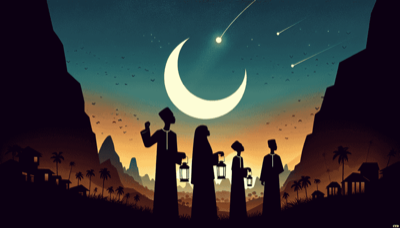We're here to help you keep count of the days to or since a date. Just click the button below and enter your chosen date to get started. Also choose the suggested days or search for a special day above #countingthedays

In Sierra Leone, a West African nation with a significant Muslim population, the start of Ramadan is a highly anticipated event. Like in other Islamic countries, the start of the Holy Month is determined by the sighting of the new moon. The exact date varies each year and also depends on geographical location.
Islam has been present in Sierra Leone for many centuries, introduced through trans-Saharan trade routes. The Islamic lunar calendar determines Ramadan, thus it shifts approximately 11 days earlier each year on the Gregorian Calendar.
Muslims in Sierra Leone observe the holy month of Ramadan as a time of fasting, prayer, reflection and community. From dawn to sunset, they abstain from eating or drinking as an act of spiritual discipline and devotion to Allah (God).
During this period, Muslims seek forgiveness for past sins, pray for guidance into righteousness and refrain from sinful behavior. It's also an opportunity to empathize with those less fortunate who lack adequate food and water supplies.
The day begins early with Suhoor - a pre-dawn meal before the fast starts. After this meal, there is a special prayer called Fajr. Following Fajr, fasting commences and continues throughout daylight hours until sunset.
After sunset, the Maghrib prayer is conducted which marks the end of that day's fast. This is followed by Iftar - breaking fast usually with dates and water or fruit juice before having a full dinner meal.
Throughout Ramadan nights are characterized by additional prayers called Taraweeh prayers performed after Isha prayer (night-time prayer).
Charity also plays a significant role during this holy month; Muslims are encouraged to give Zakat (charitable giving) during this period to assist those in need – reflecting one of Islam’s five pillars.
Sierra Leonean Muslims use this sacred time not only for individual reflection but also as a time for community. Many Muslims gather at mosques for communal prayers and meals, strengthening bonds within the religious community.
In Sierra Leone, Ramadan also brings about a slight change in social norms. Out of respect for those fasting, eating and drinking in public places during daylight hours is usually minimized.
The start of Ramadan in Sierra Leone is indeed a significant event marked by deep spiritual reflection, prayer and unity among its Muslim population. The significance of this holy month extends beyond the individual, fostering greater communal ties and charitable acts.